|
|
|
Sort Order |
|
|
|
Items / Page
|
|
|
|
|
|
|
| Srl | Item |
| 1 |
ID:
151429
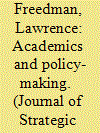

|
|
|
|
|
| Summary/Abstract |
The question of the appropriate relationship between academics and policy-makers is not new and is unlikely ever to be answered to everyone’s satisfaction. There is no rule which says that academic research must be motivated by anything other than innocent curiosity or the state of the discipline, or that policy-makers are under any obligation to take any notice of academic advice given the other demands on their time. Nor is it the case that the academic influence is invariably benign.
|
|
|
|
|
|
|
|
|
|
|
|
|
|
|
|
| 2 |
ID:
094444


|
|
|
|
|
| Publication |
2010.
|
| Summary/Abstract |
Since normalising diplomatic relations in 1972, successive Australian and Chinese governments have focused on deepening trade and investment links to such an extent that China now looms as one of the most critical countries on Australia's twenty-first century horizon. For their part, Chinese elites have welcomed closer ties with Australia and have been particularly keen to accelerate China's direct investment in the Australian mining and energy sectors. Since the early 2000s, a number of commentators have argued that Australia has been gradually drifting towards China's sphere of influence in the Asia-Pacific. This trend, they argue, has been reinforced following the election in 2007 of the Labor party government, which has terminated Australia's involvement in quadrilateral talks with the US, India, and Japan; stepped back from commitments to export uranium to China's long-standing rival, India; and intensified Australia's public criticism of Japanese whaling practices. Meanwhile, in 2008, Prime Minister Kevin Rudd made a point of paying a high profile visit to China during his first major overseas journey, but not matching it with a visit to Japan. Is Australia drifting towards China's strategic orbit in Asia? The article examines this question through the prism of three key indicators of realignment and concludes that, while there is some evidence of Australia accommodating Chinese strategic preferences in Asia, there is no indication that it is realigning itself strategically towards China and away from its long-standing ally, the US.
|
|
|
|
|
|
|
|
|
|
|
|
|
|
|
|
| 3 |
ID:
145400
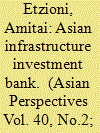

|
|
|
|
|
| Summary/Abstract |
Although some analysts have emphasized the importance of China's becoming a “responsible stakeholder” in the international order, the United States has in effect blocked China's full participation in a range of existing international institutions and attempted to undermine China's efforts to create and lead new international institutions. In this article I examine those US efforts, particularly with regard to the Asian Infrastructure Investment Bank, where the United States attempted to block other states from becoming members. I explore the difference between multifaceted and aggression-limiting containment and propose that the United States apply the latter to help stabilize Sino-US relations.
|
|
|
|
|
|
|
|
|
|
|
|
|
|
|
|
| 4 |
ID:
103543


|
|
|
|
|
| Publication |
2011.
|
| Summary/Abstract |
The proposed introduction of National Citizen Service (NCS) by the Conservative party survived the negotiations with the Liberal Democrats and forms part of the coalition's policy agenda. The idea forms part of the concern of Cameronian Conservatives to create a big society, based primarily upon volunteering and civil engagement. Drawing upon comparisons with state and private sector-led models of citizen volunteering in Germany and the United States, this article explores the evolving rationale for the introduction of NCS and evaluates the issues and pitfalls which may arise.
|
|
|
|
|
|
|
|
|
|
|
|
|
|
|
|
| 5 |
ID:
192976
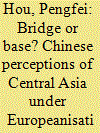

|
|
|
|
|
| Summary/Abstract |
The article examines how China perceives Central Asia under Europeanisation after the Cold War (1992-2022). Central Asia is a geo-economically significant frontier zone between China and the European Union (EU). The EU released the Central Asia strategies in 2007 and 2019. Although there were no immediate policy reactions from neighbouring China, we can sketch China’s seemingly paradoxical perceptions of the region by scrutinising official narratives. The perceptions have been simplified into the bridge-base dyad. As a land bridge, Central Asia connects China with the EU, the role of which gained growing significance against the backdrop of the Russia-Ukraine conflict. As a possible ideological base, Central Asia, under Europeanisation, may spread incompatible norms to the contiguous Xinjiang. Wary of creeping foreign hostile forces, China particularly underlines Xinjiang’s stability.
|
|
|
|
|
|
|
|
|
|
|
|
|
|
|
|
| 6 |
ID:
158238
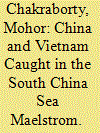

|
|
|
|
|
| Summary/Abstract |
Over the past four months, China has been swept by the ‘Xi wave’, stimulating a tide of concerns for its neighbours and ardent observers. Xi’s 203-minute speech at the 19th Congress of the CCP, followed subsequently by the CCP’s announcement of dropping the term limits for president (in February 2018) clearly herald the dawn of a “new era” of politics and power for a more assertive China, under the leadership of President Xi.
|
|
|
|
|
|
|
|
|
|
|
|
|
|
|
|
| 7 |
ID:
138699
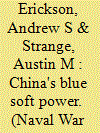

|
|
|
|
|
| Summary/Abstract |
On 3 September 2014, almost six years since Chinese warships first entered the Gulf of Aden to fulfill antipiracy duties, China Central Television (CCTV)–8 aired the first episode of “In the Gulf of Aden” . The multidozen-episode program, designed to “ignite raging patriotism” , given evening prime-time status, and attracting a popular audience with a star-studded cast, explores in dramatic fashion Beijing’s experience fighting modern piracy. Produced by the People’s Liberation Army Navy (PLAN) Political Department’s Television Art Center over three years, the series offers a unique window into how the PLAN has conducted its antipiracy mission and seeks to portray its experience to a Chinese audience.
|
|
|
|
|
|
|
|
|
|
|
|
|
|
|
|
| 8 |
ID:
172806
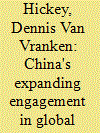

|
|
|
|
|
| Summary/Abstract |
FOR MOST OF THE NINETEENTH AND MUCH OF THE TWENTIETH CENTURY, CHINA was called, "the sick man of Asia (东亚病夫, dong ya bing fu)."1 But those days are over. As President Xi Jinping observed, "China has bid farewell to the problems that plagued its people for thousands of years, including hunger, shortages and poverty" (Yu 2019, 19). As described below, China is now one of the world's top economic, political and military powers.
|
|
|
|
|
|
|
|
|
|
|
|
|
|
|
|
| 9 |
ID:
137418


|
|
|
|
|
| Summary/Abstract |
Noting that European Union (EU) institutions are increasingly engaged in civil protection in the member states, security governance is used as an analytical framework to assess the depth of EU engagement in delivering civil security. It is shown that a state-centric approach is no longer adequate to understand the provision of civil security across Europe. To varying degrees, the EU has acquired responsibilities to facilitate, coordinate, manage, and regulate civil security, whether before or after a civil crisis occurs. The analysis demonstrates that, whilst intergovernmental practices and inter-state cooperation remain salient features of civil security, the responsibilities undertaken by the EU institutions across the entire policy spectrum are more substantial than a strictly intergovernmental perspective would suggest.
|
|
|
|
|
|
|
|
|
|
|
|
|
|
|
|
| 10 |
ID:
187599
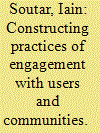

|
|
|
|
|
| Summary/Abstract |
Energy transitions require engagement with users, local communities and wider publics in order to be fair, acceptable and, ultimately, successful. Here we focus on the development of decentralised energy systems instigated by central government. Smart Local Energy Systems (SLES), involving low carbon generation, demand sources and smart technologies in a geographically-bounded location, are important but unexplored contexts for public engagement. Drawing on 23 interviews with partner organisations in 12 UK SLES projects, we investigate the targets, methods and rationales of engagement. Partners engage a range of user and community groups around multiple energy system components using a variety of methods, directly and via intermediary organisations. Project size is not a major influence on breadth and intensity of engagement. Project partners rationalise practices with reference to characterisations of users and engagement, and practices are conditioned by a range of factors (e.g. technological boundaries, place, partners involved, and the wider organisational context within which SLES projects take place). We highlight a need for future SLES policy to emphasise engagement as a key facet, institute systematic social learning between SLES projects, and consider how to engage publics beyond the boundaries of individual projects.
|
|
|
|
|
|
|
|
|
|
|
|
|
|
|
|
| 11 |
ID:
192959
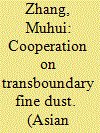

|
|
|
|
|
| Summary/Abstract |
In this article, I investigate Korea's prudential environmental diplomacy with China regarding transboundary fine dust pollution from the perspective of Korea's disadvantageous position vis-à-vis China due to the ambiguity of pollution responsibilities and geopolitical constraints. Against this backdrop, Korea has tactically exercised prudential environmental diplomacy toward China in dual tracks. First, it has taken a "high-profile" stance in engaging with and socializing China into bilateral and multilateral frameworks and endeavors to align its environmental interests with those of China via scientific and technological cooperation. Second, Korea has undertaken a cautious procedure and is not pressuring China by pursuing legal-binding approaches immediately. I see a "mixed success" of Korea's environmental engagement with China and appraise Korea's policy flexibility and pragmatism.
|
|
|
|
|
|
|
|
|
|
|
|
|
|
|
|
| 12 |
ID:
087422


|
|
|
| 13 |
ID:
176576
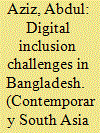

|
|
|
|
|
| Summary/Abstract |
This study assesses the impact and effectiveness of the National Information and Communications Technology Policy (NIP) in Bangladesh, which is a key legal framework for ‘Vision 2021’ and ‘Digital Bangladesh’. It investigates the extent to which digital inclusion can be achieved by the NIP strategies, as well as exploring the conceptualisation of digital inclusion, which undergirds the contemporary debate on the digital divide and inclusion. The study employs a qualitative approach using policy goal-means analysis to explore critical scrutiny of the internal rationality and logic of the NIP based on three distinct criteria of the digital inclusion analytical framework: ICT access, use and skills. The analysis argues that the policy is ambiguous and techno-centric, with a narrow digitisation frame of reference, which does not comprehensively address the issues associated with digital inclusion. Policy needs to be consistent and relevant to a person’s daily life, giving the user a sense of empowerment and skill. The article concludes that a focus on a skill-based approach and the context of societal challenges of Bangladesh is crucial to ensuring digital inclusion.
|
|
|
|
|
|
|
|
|
|
|
|
|
|
|
|
| 14 |
ID:
121733
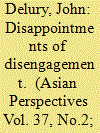

|
|
|
|
|
| Publication |
2013.
|
| Summary/Abstract |
As a presidential candidate, Barack Obama boldly promised to enhance US engagement with North Korea (Democratic People's Republic of Korea; DPRK). But in his first term as president, his administration was determined to significantly lower the foreign policy priority of North Korea and carried out a policy of concerted disengagement, an approach the administration called "strategic patience." The strategy of disengagement showed disappointing results by late 2010, and so the United States made a begrudging, tactical adjustment by starting tentative bilateral talks with the DPRK. When the preliminary result of those talks-the "Leap Day Deal"-fell apart in 2012 over the satellite launch controversy, the wrong lesson was learned: that neither sanctions nor engagement works with Pyongyang. The real lesson of Obama's North Korea policy is the failure of disengagement.
|
|
|
|
|
|
|
|
|
|
|
|
|
|
|
|
| 15 |
ID:
087303
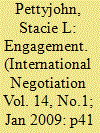

|
|
|
|
|
| Publication |
2009.
|
| Summary/Abstract |
This article argues that under certain conditions the United States can play an important role in peacefully resolving a conflict involving an ally and a nationalist terrorist organization (NTO) by engaging the NTO. An American policy of engagement can bring both parties to the table by convincing them that they are trapped in a mutually hurting stalemate and that negotiations offer the only way out of this situation. In addition, engagement provides the U.S. with significant leverage over both of the disputants, enabling it to push both parties to make the concessions necessary to realize a settlement. However, engagement can only have these effects if the U.S. bias towards its ally is tempered and if its policy is serious, sustained, and conditional. For these conditions to hold, there must be significant domestic support within the United States for a policy of engagement. These arguments are illustrated with case studies of the U.S. engagement of Sinn Fein between 1994 and 2005 and the U.S. dialogue with the Palestine Liberation Organization between 1988 and 1990.
|
|
|
|
|
|
|
|
|
|
|
|
|
|
|
|
| 16 |
ID:
141522
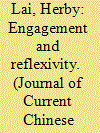

|
|
|
|
|
| Summary/Abstract |
Amidst political tensions between China and Japan, and against the backdrop of the patriotic education campaign in China that promotes a negative image of Japan as the victimiser, Chinese students in Japanese educational institutions study and work in Japan in a highly politicised context. In general, how they chose to interpret their experiences in Japan, and their views on history and controversial political issues involving China and Japan, demonstrates two levels of cosmopolitanism – namely, the ability and the willingness to engage with Japanese people on such issues, and reflexivity towards their own national identities. Meanwhile, some informants would deliberately avoid talking about history and controversial political issues involving China and Japan. While they lacked the willingness to engage with Japanese people on controversial issues, their keenness to separate their daily lives in Japan from the political context means they were also engaged in a reflexive reconfiguration of their national identities.
|
|
|
|
|
|
|
|
|
|
|
|
|
|
|
|
| 17 |
ID:
142197
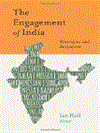

|
|
|
|
|
| Publication |
Washington, DC, Georgetown University Press, 2014.
|
| Description |
x, 217p.pbk
|
| Series |
South Asia in World Affairs Series
|
| Standard Number |
9781626160866
|
|
|
|
|
|
|
|
|
|
|
|
Copies: C:1/I:0,R:0,Q:0
Circulation
| Accession# | Call# | Current Location | Status | Policy | Location |
| 058388 | 327.54/HAL 058388 | Main | On Shelf | General | |
|
|
|
|
| 18 |
ID:
128474
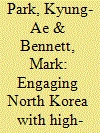

|
|
|
|
|
| Publication |
2014.
|
| Summary/Abstract |
As articulated by Joseph Nye, soft power is the ability to achieve goals through attraction rather than by threat or conflict. Although frequently associated with the state and foreign policy, non-state actors can also develop and possess soft power independent of the state. In particular, educational institutions have long held significant amounts of soft power that transcend national boundaries. Through knowledge sharing, educational institutions can leverage soft power to influence a society through educating its social and political elites, and future leaders.
Knowledge sharing that focuses on human resource development is one of the most successful areas of cooperation between North Korea and the international community. Knowledge sharing activities not only give North Korean participants access to knowledge but this access contains an important potential for socialization effects - the spreading of ideas, customs and values. Despite this, however, the current body of literature on knowledge sharing is quite limited.
Based on the on-going knowledge sharing experiences with North Korea at the University of British Columbia, this paper explores the nature and the development of knowledge sharing with Pyongyang, demonstrating that North Korea can be a 'willing interpreter and receiver' of soft power. Using the concept of university soft power, the paper proposes that educational institutions are inherently effective in using their influence and expertise to initiate successful, long-term knowledge sharing with North Korea. It will also examine strategies for successful knowledge sharing with Pyongyang and the impacts of such knowledge sharing with relation to engagement efforts with North Korea.
|
|
|
|
|
|
|
|
|
|
|
|
|
|
|
|
| 19 |
ID:
153579
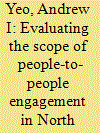

|
|
|
|
|
| Summary/Abstract |
Although North Korea remains one of the most isolated countries in the world, hundreds of foreign actors continue to work quietly inside the country. What is the size and scope of foreign engagement inside the Democratic People's Republic of Korea (DPRK)? What types of activities do nongovernmental organizations, businesses, and other private actors conduct? What has been the experience and impact of those working inside the DPRK? Relying on an original data set and interviews with sixteen organizational field representatives and staff members with experience working inside the DPRK, I uncover basic trends related to people-to-people engagement in areas such as humanitarian relief, development assistance, educational assistance, professional training, and business interaction. Although impressive growth has taken place in foreign engagement in the DPRK, its potential impact remains unclear due to ongoing internal and external constraints.
|
|
|
|
|
|
|
|
|
|
|
|
|
|
|
|
| 20 |
ID:
056915
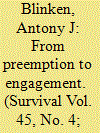

|
|
|
|
|
| Publication |
2003.
|
| Description |
p33-60
|
|
|
|
|
|
|
|
|
|
|
|
|
|
|
|
|
|
|
|
|